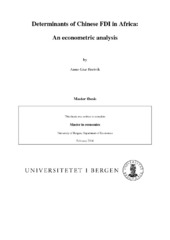| dc.description.abstract | The aim of this thesis is to examine the determinants of Chinese FDI in Africa over the period from 2003 to 2011. The investigation is based on a sample of panel data from 49 African countries, using aggregate Chinese outward FDI as the dependent variable. China's outward FDI to Africa has in recent years increased exponentially. In 2005 Chinese FDI in Africa reached 1.6 billion US dollars, and by the end of 2011 this had increased to 16 billion US dollars. This has caused a great debate of the motives behind the increased Chinese presence on the continent, and the host country determinants of Chinese FDI. According to the main results found in the econometric analysis Chinese FDI in Africa is attracted to countries with large markets and natural resources. The main finding of the thesis is that there is found no evidence that Chinese outward FDI is more attracted to natural resources in countries with poor institutions and high political risk. The results rather indicate that good institutions in interaction with natural resources are a determinant of Chinese FDI in Africa. I have also looked at the question of whether the Chinese invest differently in Africa than other investors. Here, the main results are that investors in general are attracted to countries with larger markets, and more natural resource export. The result suggests that Chinese investors in Africa are not so different than other investors in Africa, when it comes to market-seeking and natural resources-seeking. However, the main difference is that institutions are not a significant determinant when the dependent variable is total inflow of FDI, whereas for Chinese FDI it is significant. In addition, I have also looked at the question of whether Chinese investments in Africa are different than Chinese investments elsewhere. The result from this analysis suggests that GDP, or market size, and trade openness, in addition to natural resources has significant association with Chinese FDI globally, and thus, the Chinese FDI globally is market-seeking in addition to natural resource-seeking. All calculations and estimations are conducted using STATA version 12.0. | en_US |
